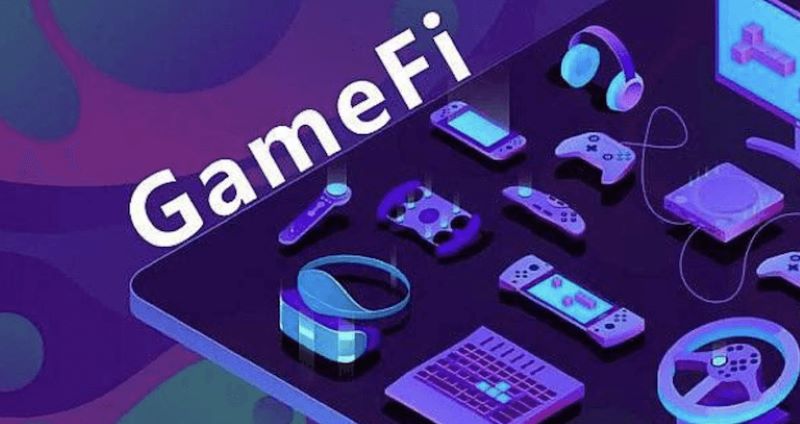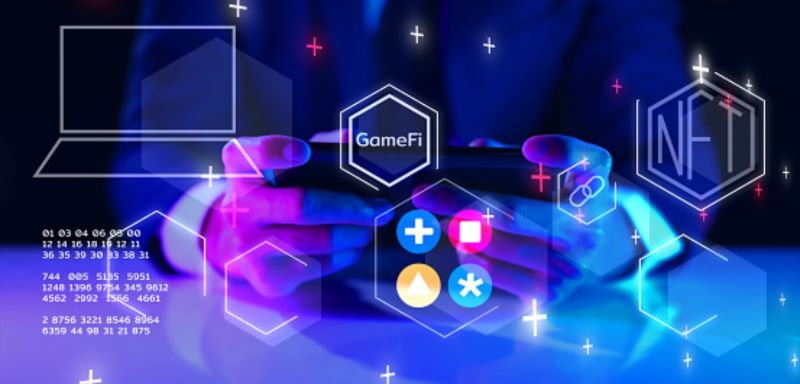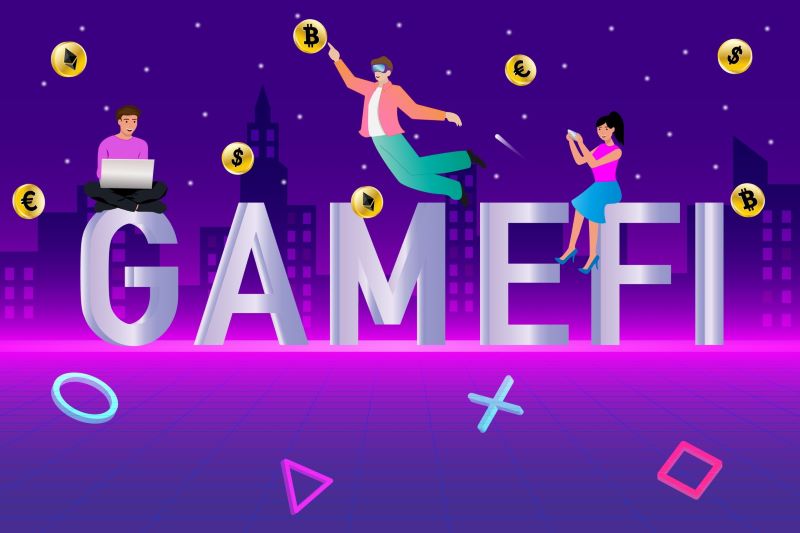Welcome to the GameFi Revolution: How Blockchain Merges with DeFi for Ultimate Gaming. Picture a world where gaming and finance morph into one. This isn’t a fantasy; it’s where GameFi blends Blockchain and DeFi to craft an arena where play meets pay—where you, the gamer, are in the driver’s seat of your financial destiny. If you’re itching to delve into new realms of gaming that reward your skills with real value, let me guide you through this groundbreaking journey. Get ready to explore how this synergy is not just altering the gaming landscape but could very well redefine wealth in the virtual and real world.
The Convergence of Decentralized Finance and Gaming
Understanding the Play-to-Earn Model
Play-to-earn is big now. You play games, and you earn real cash. Simple, right? But there’s more to it. In crypto gaming platforms, earning through play is not just a perk; it’s the core idea.
Take your classic game. You beat levels, get points. Now, add DeFi. Those points become crypto you can spend, save, or trade. This is the play-to-earn model. It links fun and finance like never before.
With this model, everyone gets a fair shot to earn. You don’t need to be a pro gamer or a big investor. Play well, earn tokens, and join the digital asset economy. You game, you gain.
Players love this. And why not? You get to make money doing what you love. It levels the field in the DeFi gaming industry. Plus, it’s changing how we think about gaming and working.
But don’t rush yet. Think it through. Know your game. Pick right, and the play-to-earn model could mean good money. Sure, there are risks in GameFi. Like any investment, it’s not all fun and games.
The Role of NFTs in Enriching Gaming Experiences
Now, let’s talk NFTs in gaming. These aren’t just cool art. They’re assets, like unique game tools and virtual land ownership. Owning an NFT can mean having a rare sword that no one else in the game has. It’s a big deal.
Games have used items for ages, but now you truly own them as NFTs. And they’re a smart way to earn more. Why? Because they can grow in value. Sell them in the NFT gaming market, and sometimes, you’ll earn big.
The use of smart contracts in gaming keeps it fair. They’re like rulebooks that nobody can mess with. If you earned an NFT, it’s yours. No take-backs. This trust builds strong virtual economies.
Imagine owning a cool shirt in a game. A few clicks later, you’re trading it and earning crypto. It feels great, right? This is NFTs in action, making gaming rewards real-world valuable.
You’re part of a living, breathing market now. But remember, it’s not just a game. It’s a player-driven economy. You make choices that have real results. Do well, and it pays off in game and in your wallet.
We’re at the start of something big. The DeFi games development world is buzzing. There’s a lot to learn and lots to earn. Get in the game, and take your gaming from hobby to a source of income.
In this blend of gaming and finance, the future shines bright. Join us. Play, earn, and be part of the GameFi revolution!
Building the Infrastructure of GameFi
The Significance of Smart Contracts in Game Development
When we talk about video games and making money, things get fun. Imagine playing a game and earning real cash. That’s what’s shaking up the gaming world. It’s called GameFi, where blockchain meets gaming. In this blend, smart contracts are key. They’re like invisible rules that make sure everything in the game is fair and safe. For example, they handle who owns which virtual items.
These smart contracts make sure you really get what you win or buy. This trust is what makes people excited to play and trade. Gamers know they won’t get scammed. It’s a big deal because trust is hard to build online. Imagine trading a rare sword in a game without worry. That’s what these smart blocks of code give us—peace of mind.
Maintaining Liquidity and Asset Trading in DeFi Games
Now, to keep things moving in these blockchain games, money needs to flow. That’s the game’s lifeblood. This flow is what we call liquidity. It’s like having enough water in a pool so that everyone can swim. In gaming, liquidity lets players buy, sell, and trade without hitches. And how is this magic made? Through DeFi, short for decentralized finance.
DeFi is the backbone of these money-making games. It lets you deal with money without a bank. Imagine a playground where everyone can lend, borrow, and trade. No asking for permission, no waiting lines. You might wonder, how do I jump in? First, you own some gaming cryptocurrencies. These are like tickets to the fun.
Then, you’re all set to trade items, like skins or weapons. There’s more you can do, like yield farming, where you can earn rewards. Think of it as planting a seed in a game and watching it grow into more coins. It’s pretty exciting to see your efforts pay off.
But, there are risks, too. Not all games last forever, and bad things can happen. As an expert, I always say, know the risks. These games can offer lots of fun and maybe profits. Yet, it’s wise to play it safe and not bet the farm. The key is balance and keeping your eyes open.
In conclusion, building GameFi’s world is like creating a wild park where games and finance play together. With smart contracts guarding the gate, and DeFi watering the garden, the possibilities in crypto gaming platforms are blooming. It’s a powerful mix, full of chances for players who are ready to dive in. Let’s keep an eye on this trend and grab the opportunities it brings to our virtual and real-world wallets.
Navigating the GameFi Ecosystem
Risk Assessment for Players and Investors
In the GameFi world, risks are real. Just like with all games, you can win or lose. But in crypto games, your money is on the line. Making the right choices matter a lot. I tell folks, look at the play-to-earn model first. How does it work? Can you really get good money out of it? These games let you earn through play. You can get gaming cryptocurrencies just from having fun.
Next, look at the game itself. Is it built to last, or could it crash and burn? Nobody wants their hard work to vanish overnight. And check the team behind the game. Do they know their stuff? We’ve seen lots of play-to-earn ecosystem promises. But talk is cheap. Delivery is key.
And NFTs in gaming, that’s a big new thing. They can be like your trophy on the blockchain. You can own unique items and even trade them. But remember, the value of NFTs can swing wildly.
DeFi games development isn’t easy to get. Blockchain game mechanics need to run smooth. Plus, they must keep gamers hooked. If a game’s good, players stick around. More players mean a healthier digital asset economy in that game.
Last part of the risk talk is the big ‘L’ – liquidity in gaming. What’s that? Well, it means can you turn your game earnings into real cash, and how fast? No one wants to be stuck with game coins they can’t use.
When it’s done right, financialization of gaming can thrive. But if not, it goes bust. So doing your homework is key. What’s the takeaway here? Be smart. Know the DeFi gaming industry before you jump in.
The Impact of Gaming Guilds on Player Earnings
Now, about gaming guilds blockchain style. What are these? Think of them as teams or clubs. They’ve got lots of players all focusing on earning through play. They share tips, support each other, and sometimes pool resources. This is where the idea of player-driven economies comes alive.
Guilds get you past tough spots in games. They lend out starter packs with NFTs or in-game currency blockchain stuff. They help newbies get going. Once you’re up and running, you give back a share of what you earn. Fair deal, right?
They can impact the NFT gaming market big time. With experts pulling strings, they can boost the whole market up. Players get to make more because they’ve got backing. And with the right guild, you’re better set to dodge risks in GameFi.
So what’s the deal with guilds? They can mean better earnings and a smoother start in this world. But like with any club, pick a good one. They should add real value to your game and your wallet.
In the end, whether you play solo or join a guild, GameFi is about smart plays. Know the risks. Understand the rewards. Go the distance. The GameFi revolution’s not just about fun and games, it’s about playing them with wisdom.
The Future of Interoperable Assets and Regulation in GameFi
Advancing the Digital Asset Economy with Interoperable Game Assets
We’re on the brink of a huge shift. I’m talking about the GameFi wave. This is where the fun of games meets the brains of blockchain. What does this mean for you and me? We’re looking at a future where your digital goods, like swords and space ships, aren’t locked in one game. They travel with you across the crypto gaming platforms.
This is the magic of interoperable game assets. It opens doors to a new digital asset economy. Imagine taking your rare dragon from one game to another. Or sell it to another player who needs it for his quests. The crypto game tokens you earn in one place might help you in another game. This makes every minute you play worth more.
Earning through play just gets real. The play-to-earn model isn’t a fad. It’s the heart of this blockchain gaming trend. You play, you earn, and your assets follow you. No more wasted effort. This is a big step for DeFi games development. With smart contracts in gaming, it’s all fair and square. Your rights as a player are set in virtual stone, thanks to the blockchain.
But it’s not just a free-for-all. We’re weaving a web of rules to keep things on track. We dive into why the regulation of GameFi matters next.
Ethical Considerations and Regulation in the DeFi Gaming Space
Let’s talk about playing it safe. With money on the line, we have to think about ethics and rules. The DeFi gaming industry grows fast – and with it, the risks in GameFi. We need clear rules to keep the play-to-earn ecosystem honest. It’s not just about fun. It’s about your hard-earned cash too.
We can’t have bad apples ruining the batch. This is why gaming decentralized applications, known as dApps, need strong standards. What if someone finds a loophole in a game? We need systems in place to fix that fast. It’s the same for financialization of gaming. We must keep an eye out so everyone gets a fair shot.
That’s where regulation comes in. Smart, thoughtful rules help players and creators thrive. They also protect your gains and guide DeFi gaming platforms towards better practices. This keeps your gaming cryptocurrencies safe and your earnings clear.
Think of these rules as the guardrails on a race track. They’re not there to slow you down. They’re there to make sure you can race ahead without crashing. And when more people trust the system, we all win. More players. More games. More chances to earn.
The future of DeFi in gaming is bright. But that future depends on how we guide it today. The NFT gaming market expands, and it’s up to us to make it shine. Let’s do it right, together.
We’ve explored how Decentralized Finance (DeFi) blends with gaming. By understanding the play-to-earn model and the role of NFTs, gamers can now earn real value from their skills and dedication. Building a solid infrastructure for GameFi is crucial. Smart contracts make games fair and secure, while liquidity ensures assets keep their value.
As we navigate the GameFi ecosystem, it’s clear that risks need careful thought. But with gaming guilds, players have new ways to earn and grow. Lastly, we peeked at the future where game assets move freely across platforms, and where fair play is the rule, thanks to new regulations.
This blend of DeFi and gaming changes how we play and profit from games. It’s an exciting shift that’s here to stay, with endless possibilities for players and developers alike. Embrace it, learn it, and you may reap the rewards.
Q&A :
What exactly is GameFi and how does it integrate blockchain and DeFi?
GameFi is an innovative approach to gaming that combines the immersive elements of traditional video games with blockchain technology and decentralized finance (DeFi) mechanisms. It allows players to earn real-world financial rewards through gameplay, leveraging blockchain for secure asset ownership, and DeFi to create play-to-earn models. As it incorporates tokenization, non-fungible tokens (NFTs), and smart contracts, players can earn, buy, sell, and trade in-game assets with actual monetary value.
How does GameFi create real-world earning opportunities for players?
GameFi disrupts the traditional gaming industry by introducing a play-to-earn model, which enables players to earn cryptocurrency or digital assets through their in-game activities. By completing quests, winning battles, or participating in challenges, players can accumulate tokens or NFTs that can have real-world value. These digital assets can be traded on various exchanges or used within DeFi platforms to earn yield, providing players with both entertainment and potential financial benefits.
What role do NFTs play in GameFi ecosystems?
Within GameFi ecosystems, non-fungible tokens (NFTs) play a pivotal role as they represent unique in-game assets such as characters, equipment, land, and more. These NFTs can be bought, sold, or traded on different marketplaces, often yielding profit for players due to their rarity and demand. NFTs are integral to the GameFi model as they provide players with verifiable ownership of these digital items on the blockchain, adding a layer of economic incentive to the gaming experience.
Can you earn money by playing GameFi games, and is it safe?
Yes, it is possible to earn money by playing GameFi games through the play-to-earn model. However, like any investment or money-making opportunity, it comes with risks. The safety of earning within GameFi depends on factors such as the legitimacy of the game developers, the security of the game’s smart contracts, and market volatility. It’s important for players to do their own research and understand the risks before investing time or money into GameFi platforms.
Is GameFi accessible to casual gamers, or is it only for crypto enthusiasts?
GameFi is designed to be accessible to both casual gamers and crypto enthusiasts alike. While having a basic understanding of blockchain and cryptocurrency can enhance the experience, many GameFi projects aim to lower the entry barrier, offering user-friendly interfaces and tutorials to help new players navigate the gaming and economic aspects of the platform. As the GameFi sector grows, more games are tailoring their experience to be inclusive for a broader audience that may not have extensive knowledge about blockchain or DeFi.


